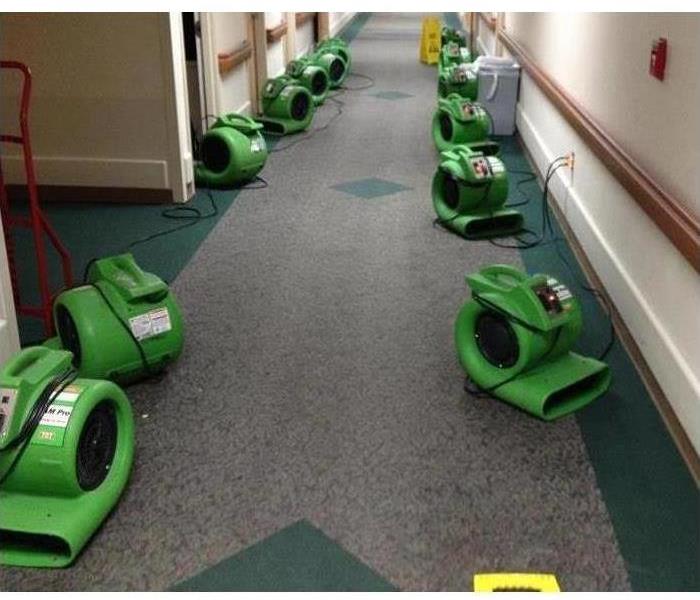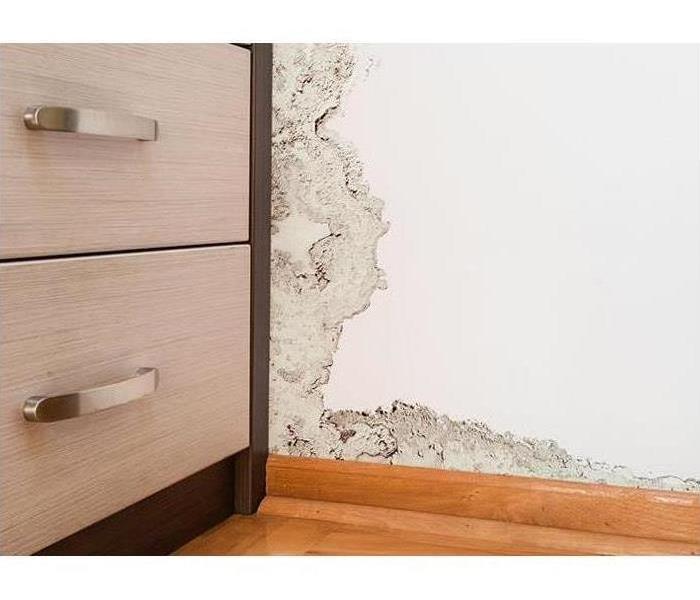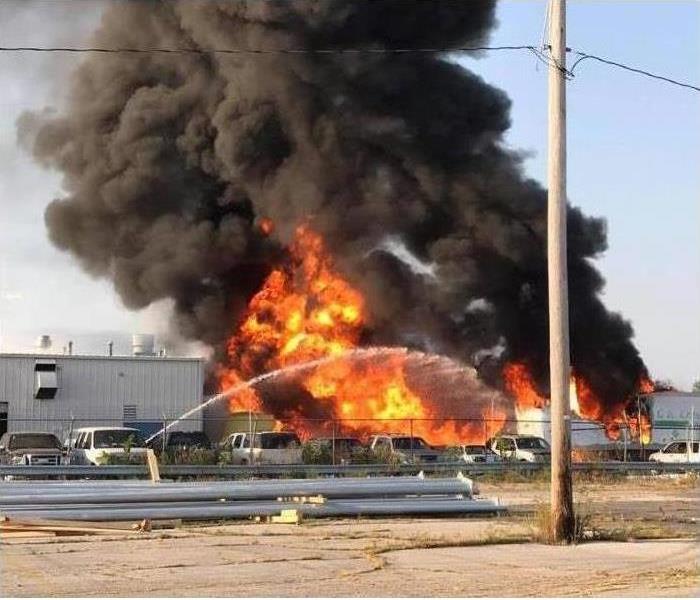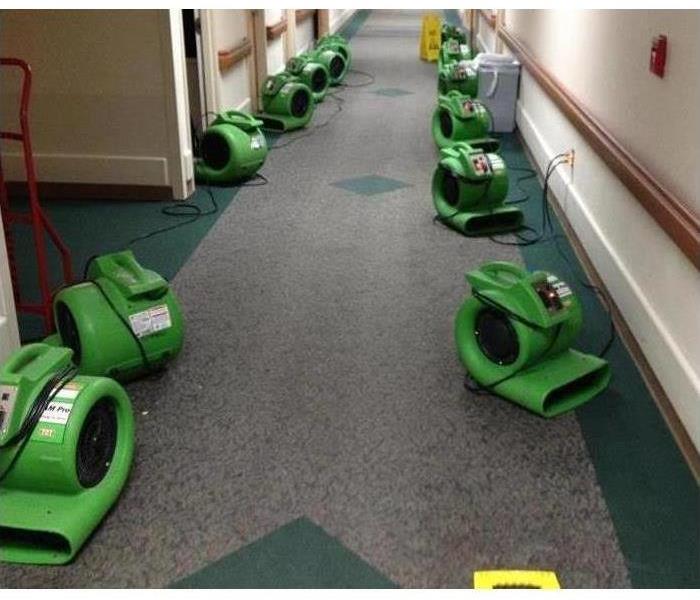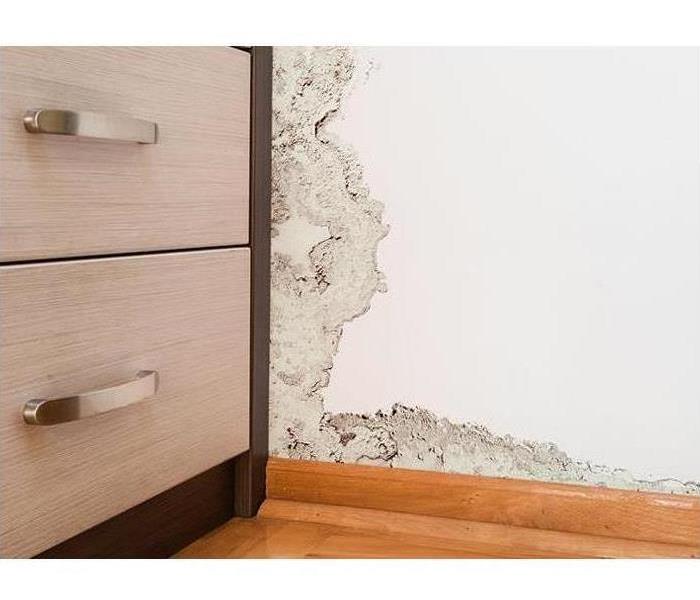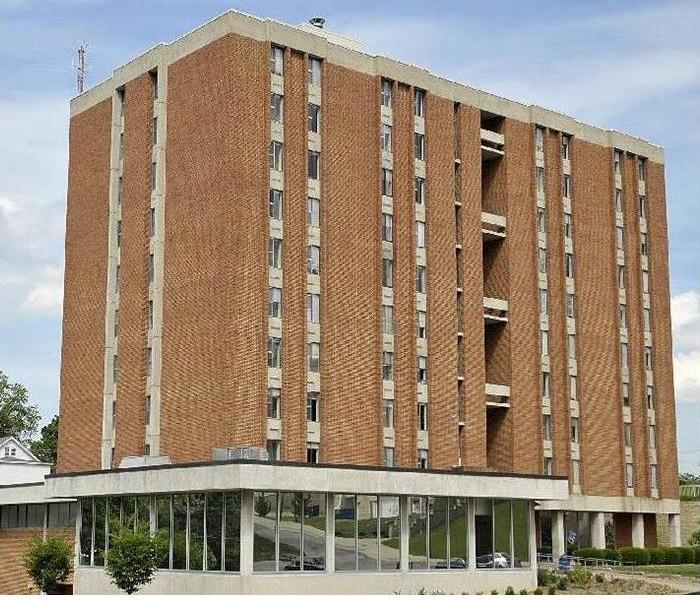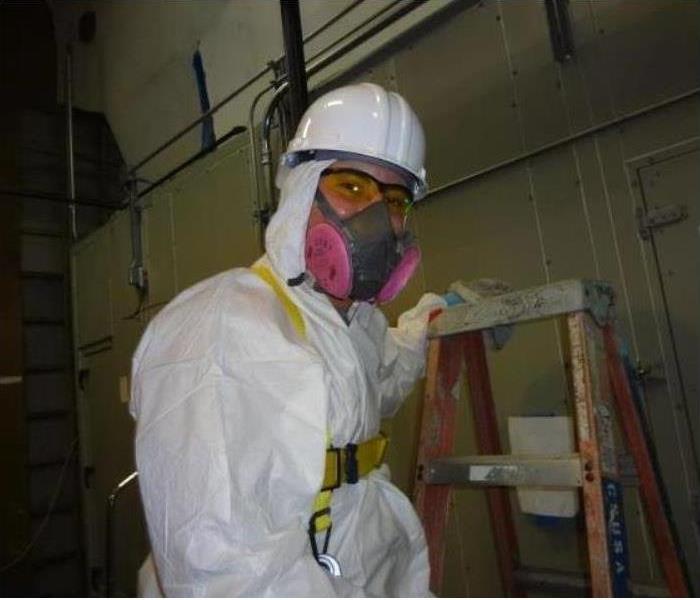Recent Commercial Posts
Restoring your Commercial Property after a loss
1/5/2022 (Permalink)
Flooding and water damage events at Lenoir, Duplin or Jones County commercial properties are often complex with numerous issues that require a knowledgeable and flexible response. Whether we’re dealing with a relatively small water cleanup scenario or a large scale event, we work quickly to assess each unique situation and isolate the damaged area. In many instances, normal operations can continue in a temporary space while we restore your facility.
Restoring Commercial Properties Presents Unique Challenges
Our professionals are trained to be mindful of legal and environmental concerns and strive to fully restore the damaged area while working within your budgetary constraints. We understand that every hour spent cleaning up is an hour of lost revenue and productivity. So when an emergency situation arises in your business, give us a call and we’ll be there fast with the help you need.
SERVPRO of Lenoir, Duplin & Jones Counties specializes in the cleanup and restoration of commercial and residential property after a water damage event. Our staff is highly trained in property damage restoration. From initial and ongoing training at SERVPRO’s corporate training facility to regular IICRC-industry certification, rest assured our staff is equipped with the knowledge to restore your property.
Protecting your business from mold
1/5/2022 (Permalink)
At a business, mold not only has the ability to damage the building, it could possibly cause health issues for your employees and your customers. There are several causes of mold, but mold usually results from excessive water moisture that is never dealt with. Mold thrives in warm, humid, and areas with a a lot of moisture.
When any of the above issues exist, mold can grow. Some types of mold can grow very fast, sometimes within a matter of a couple of days. If mold is not dealt with, it could possibly cause many symptoms of sickness in employees and customers, such as eye irritation, congestion, coughing and skin rashes. In some cases, mold could also cause fever, shortness of breath and infection.
SERVPRO of Lenoir, Duplin and Jones Counties would like to offer a few tips to prevent mold from growing in your place of business.
- Control water and moisture accumulating in your building.
- Never install carpet in excessively high moisture areas such as bathrooms and basements.
- Keep the building properly ventilated at all times.
If a leak is found, make sure it is taken care of as soon as possible and remove any wet materials. Preventing the growth of mold will not only protect your building and business, it will also provide a safer environment for your employees and customers.
Fire prevention and your business
11/9/2021 (Permalink)
As cooler temperatures continues throughout the area, business owners and managers try to keep their employees as comfortable as possible. Many people don’t usually associate the spring months with accidents involving fire. It is very important that business owners try to keep fire safety on their minds throughout the year.
SERVPRO of Lenoir, Duplin and Jones Counties would like to offer a few tips to keep your business from becoming another fire statistic.
Equip the building with fire extinguishers. Have them placed strategically in the building and make sure employees know how to use them.
Prepare a Safety Plan. Make sure smoke detectors are checked regularly, inspect the fire extinguishers at least twice a year, and if the business has a sprinkler system be sure to test it also.
Inspect the interior of the building. Make sure that any flammable liquids or items are stored appropriately in their containers so they won’t catch on fire. Examples of these items are paper, building materials, paint, or cloth.
Check the buildings perimeter. You need to make sure there are no materials that could burn quickly, including trash, wood or paper. Also, make sure the buildings landscaping is free of weeds and is maintained regularly.
Follow these tips and keep your business and your employees safe throughout the year.
A water loss at your business is our business!
11/3/2021 (Permalink)
When business owners visualize water damage, they often picture a massive storm wiping out power lines, flooding offices, and shutting down businesses for days at a time. It is true that commercial water damage is often the result of floods and water that stems from weather events and storms.
However, many entrepreneurs and business space renters forget that storms and severe weather aren't the only causes of floods and water damage. Here are some of the typical causes of water damage to commercial buildings.
1. Outdated Sprinkler Systems
Some older office and retail buildings still have outdated sprinkler systems that work in conjunction with fire protection systems. While such sprinklers can come in handy during a fire emergency, they can also cause commercial flood damage if they are faulty or in need of replacement. This could easily damage inventory and business assets.
2. Damaged Appliances and Equipment
This cause of commercial flood damage is more common in restaurants and catering facilities, as well as any business that has appliances and equipment that make use of water. If the appliance fails and sends water across your building, especially during late hours when no one is around, you may come back to work and face a water emergency.
3. Busted Pipes and Plumbing
Just like in a residence, if the plumbing system in your workplace fails water damage could be the result.
4. Backed Up Sewer Lines
This is another cause of commercial water damage that often catches business owners by surprise. Should the sewer line to your building back up or become damaged, realize the potential dangers of contaminated Black Water which can cause health effects and ruin products and office furnishings.
If your business has suffered commercial water damage, SERVPRO of Lenoir, Duplin & Jones Counties and we'll get you back up and running again. Call us anytime 24/7 at (252) 208-7888
Strom Preparations for Your Commercial Property
9/8/2020 (Permalink)
If you work in an area like Eastern North Carolina that experiences frequent storms, you may be wondering what exterior maintenance steps you can do to help protect your business from the weather. Fortunately, there are a few steps that many experts recommend.
1. Know the Weather in Your Area
One important aspect of storm preparation is to be aware of the weather. Knowing when you can expect a large thunderstorm or snow can allow you to prepare ahead of time. This can help you prevent possible damage.
2. Protect the Building as Needed
Depending on the weather you're expecting, you may choose to protect your building. Several possibilities include boarding over windows, or placing tarps over vulnerable landscaping. You may also choose to contact a local professional for a recommendation on preventive steps you can take.
3. Inspect Your Building Regularly
Another aspect of storm prevention is regular exterior maintenance. Scheduling a regular building inspection can help you find and repair any problem areas before they become vulnerable to a storm.
4. Keep up With Repairs
Keeping your building maintained can help prevent long-term damage. Conducting repairs to any damaged areas you find as quickly as possible can help you stay on top of the building's maintenance needs, and help prevent long-term repair cost.
5. Know Who to Call for Any Repairs
Another important step for storm preparation is to know who to call for repairs. In many cases a water damage restoration team can help with any flooding or water damages that may have occurred.
When preparing for a storm, these exterior maintenance steps may help you protect the building. Know what the weather in your area is going to do so that you can prepare beforehand. Inspect the property regularly, and conduct repairs as soon as a problem area is found. For large repair jobs you may want to contact a professional.
Commercial sprinkler systems and what you need to know
9/8/2020 (Permalink)
The fire sprinklers in commercial properties are vital to the safety and continued operations of businesses. However, while many property owners install these systems and forget about them, sprinkler maintenance is pivotal to the continued protection and viability of these systems. Different elements of your sprinklers should be checked at various intervals throughout the year.
1. Every Week
At least once a week you should check the control valves and the gauges. However, this varies based on sprinkler style. Control valves should be tested on any system, ensuring they are properly sealed, free of blockages and in the open position. Gauges on a deluge, pre-action or dry system should be inspected weekly for normal pressure readings.
2. Every Month
General sprinkler maintenance requires that gauges in a wet pipe or water-based system are inspected at least once per month. Also, alarm valves should be checked externally. Primarily, you are looking for any signs of damage and checking that appropriate pressure is sustained.
3. Change of Seasons
Either four times a year or at the change of every season, you should check the alarm devices and the hydraulic nameplate. The devices should be inspected for any physical defects, and the hydraulic nameplate should remain secured to the riser. Also, make sure that the nameplate is legible.
4. Once Per Year
A plumbing specialist in the area should be called out once per year to inspect the entire system. While you may be performing all the required visual inspections, a specialist will ensure that the mechanics of the system are operating as they should be.
Sprinkler maintenance is essential to the proper functioning of your fire suppressant system. Without adequate inspections, it is possible that your sprinklers will be clogged and fail during a time of crisis. Therefore, perform the visual checks as described, and once per year hire a professional.
Water damage and your business
8/31/2020 (Permalink)
A lot of commercial business owners understand that water is at many times the enemy especially when it causes them to shut down their business. Water can find its way into almost any space and will use every tiny crack it can to damage the building's structure. No matter how the water got into your business, how a company responds should be the same almost every time. SERVPRO of Lenoir, Duplin & Jones Counties has water technicians on call 24/7 that will respond within an hour of being called and will be at the sight within 8 hours. SERVPRO of Lenoir, Duplin & Jones Counties technicians are well trained to help ensure there are no health threats lingering for employees once all the moisture has been removed from the business.
Mold and your business
8/26/2020 (Permalink)
At a business, mold not only has the ability to damage the building, it could possibly cause health effects for your employees and your customers. There are several causes of mold, but mold usually results from excessive water moisture that is never dealt with. Mold thrives in warm, humid, and areas with a lot of moisture.
When any of the above issues exist, mold can grow. Some types of mold can grow very fast, sometimes within a matter of a couple of days. If mold is not dealt with, it could possibly cause health effects in your employees.
SERVPRO of Lenoir, Duplin and Jones Counties would like to offer a few tips to prevent mold from growing in your place of business.
- Control water and moisture accumulating in your building.
- Never install carpet in excessively high moisture areas such as bathrooms and basements.
- Keep the building properly ventilated at all times.
If a leak is found, make sure it is taken care of as soon as possible and remove any wet materials. Preventing the growth of mold will not only protect your building and business, it will also provide a safer environment for your employees and customers.
Five ways to prevent mold in your commercial building
8/26/2020 (Permalink)
By possibly eliminating some of the health risks associated with mold and human contact, try following these tips to try and prevent mold from growing inside your commercial building.
- Be observant: Mold can grow in places you may have never thought. Try to be mindful and develop some type of routine to search for any signs of mold or damp surfaces, areas with high moisture or humidity, and in rooms where there may be stains on the wall and have smelly carpet.
- Reduce moisture. The area of the country where your commercial building is located may mean the humidity is always going to be high. Damp air could make it easy for mold to grow in your building. You may wish to have dehumidifiers installed either in basements or attics to help keep areas dry.
- Clean the HVAC: Your building's air conditioning, heating and ventilation system can increase the chances that mold spores are blown throughout the building. By having the HVAC system and ducts cleaned on a regular basis, this may help reduce the transfer of mold spores.
- Repairs: Make repairs and any other issues with the building as soon as they happen, and always try to catch any leaks and water damage before it turns into a moldy mess. Leaky roofs, and unsealed window and door frames are all problems that can cause mold to grow.
- Let the pros handle it: The needs of almost every commercial building are different. So, sometimes to effectively prevent mold from growing, a mold remediation specialist such as SERVPRO of Lenoir, Duplin and Jones Counties may be needed. Our specialists can customize a plan to fit your commercial building. By working with our remediation specialists, we can help you feel confident that any existing mold problems are responded to quickly and hopefully eliminated in the future.
We are the CLEANING EXPERTS
7/24/2020 (Permalink)
During this unprecedented time caused by the global pandemic of coronavirus, this is a reminder to our customers that we are specialists in cleaning services, and we adhere to the highest cleaning and sanitation standards.
Specialized Training
We are prepared to clean and disinfect your home or business, according to protocols set forth by the Centers for Disease Control and Prevention. We have years of experience in dealing with biological contaminants, and we will go beyond the scope of work that regular janitorial staff perform on a daily basis.
The CDC encourages cleaning of high-touch surfaces such as counters, tabletops, doorknobs, light switches, bathroom fixtures, toilets, phones, keyboards, tablets and tables. Other spaces mentioned in the CDC’s guidance for commercial spaces include:
- Kitchen/Food Areas
- Bathrooms
- Schools/Classrooms
- Offices
- Retail Spaces
- Water Fountains
- Shelving/Racks
- Sales Counters
- Carpets and Rugs
- Stair Handrails
- Elevator Cars
- Playground Equipment
- Fitness Equipment
Specialized Products
The CDC recommends usage of a labeled hospital-grade disinfectant with claims against similar pathogens to the coronavirus. Multiple products in the SERVPRO product line carry the EPA-approved emerging pathogens claims. While there is currently no product tested against this particular strain of the coronavirus, we are following all guidelines as provided by the CDC and local authorities.
Call Today for a Proactive Cleaning
If your home or business needs deep cleaning services, call the experts today – 252-208-7888
Addressing Mold in Leases and Purchases of Commercial Buildings
5/28/2019 (Permalink)
Given the increased attention to toxic mold, owners & tenants of commercial buildings and their attorneys are starting to address mold prevention and remediation directly in leases and purchase agreements. And, due to the current lack of scientific knowledge and regulatory uncertainty, the focus should be on risk assessment and prevention of mold problems.
Tenants and purchasers considering a transaction should have an assessment for toxic mold performed by a competent consultant with experience in industrial hygiene, mold sampling and mold remediation. This protocol should become part of their due diligence process. An assessment of indoor air quality for the presence of toxic molds will establish baseline conditions and, if necessary, allow the parties to correct a pre-existing mold problem.
Practices and customs for assessing toxic mold risk and indoor air quality are still developing. Some building owners may develop protocols for regular testing and may provide results to prospective tenants or purchasers. However, most retailers contemplating a lease or purchase transaction will likely have to request permission to perform a toxic mold assessment.
Is your office energy efficient?
5/26/2019 (Permalink)
- Purchase energy-efficient office equipment. Before you buy or lease office electronics, check to see if they are ENERGYSTAR-rated. An ENERGYSTAR-rated appliance has been evaluated and deemed energy-efficient, which can save you money and help you manage your small business energy costs, especially in the long run.
- Reduce Peak Demand. One of the best ways to save electricity in an office is to reduce your peak demand. The phrase “peak demand” refers to the hours in a day when energy usage is at its highest. Peak demand times are typically normal office hours (9 a.m. to 5 p.m.). You can reduce your demand during this time by staggering work hours / start times, running heavy equipment and factory equipment during the evening and early morning hours, and conserving energy throughout the day.
- Program your thermostats. This is one of those office energy saving tips that is especially relevant for a 9-5 workplace. You don’t need to heat or cool a workplace after everyone has gone home for the night. Even if your team’s hours vary, using programmable or smart thermostats to manage the temperature during “off” hours can make a big difference.
- Turn off lights when not in use. It might seem like a no-brainer, but in a typical office, lights stay on in areas like break rooms, bathrooms, or conference rooms, even when those spaces aren’t being used. Sensor lights can help to keep the lights on when needed, but off when they’re not.
- Use energy-efficient light bulbs. It's one of the easiest and simplest energy saving ideas in the workplace: switch out your regular incandescent bulbs with energy-efficient bulbs such as CFL or LED. This will help you use a significantly less amount of electricity.
- Take advantage of natural sunlight. If you’re fortunate enough to have an office space where there’s abundant natural light, use it! On a sunny day, you might not need to turn on the lights at all in areas where windows can give all the illumination you need. While using passive solar heating might not seem like one of the ways to save energy at work, it really does help. The fewer kilowatt hours of energy you use, the less you have to pay.
- Start running fans. You can reduce your energy usage in the workplace simply and easily by running fans in offices, warehouses, showrooms and kitchens. Fans keep air flowing so your HVAC unit can run more efficiently.
- Power down computers and other office equipment at the end of the day. If computers are not being used through the hours when your staff aren’t working, have your team be in the habit of shutting them down before they leave. Turning off and unplugging as many devices as possible at the end of the day is a simple way to cut back. This includes energy efficient coffee makers, toasters, and similar appliances.
- Prevent “Phantom energy”. Phantom energy is the energy that is still being used by equipment that remains plugged in but not in use. A great office energy-saving tip is to have your computer peripherals (printers, monitors, etc.) connected to power strips (aka “surge protectors”) so that the flip of a single switch can shut down several devices at a time.
- Think outside your building. Are you in control of the landscaping around your business? If so, you have a great opportunity to create energy-savings for your small business with energy efficient landscaping. Strategically planting trees to block winds or provide shade on hot summer days can help reduce your heating and cooling costs.
Fire safety tips for your business
4/15/2019 (Permalink)
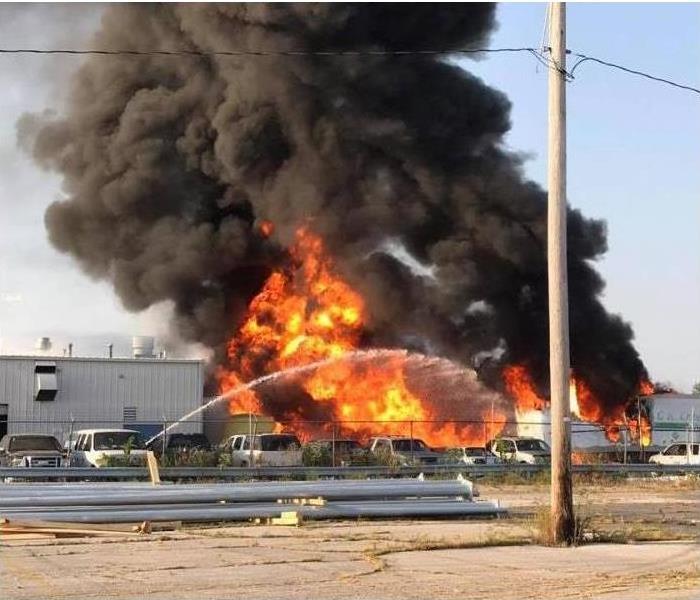 A fire in a commercial building can be devastating to everyone
A fire in a commercial building can be devastating to everyone
As cooler tempatures continues throughout the area, business owners and managers try to keep their employees as comfortable as possible. Many people don’t usually associate the spring months with accidents involving fire. It is very important that business owners try to keep fire safety on their minds throughout the year.
SERVPRO of Lenoir, Duplin and Jones Counties would like to offer a few tips to keep your business from becoming another fire statistic.
Equip the building with fire extinguishers. Have them placed strategically in the building and make sure employees know how to use them.
Prepare a Safety Plan. Make sure smoke detectors are checked regularly, inspect the fire extinguishers at least twice a year, and if the business has a sprinkler system be sure to test it also.
Inspect the interior of the building. Make sure that any flammable liquids or items are stored appropriately in their containers so they won’t catch on fire. Examples of these items are paper, building materials, paint, or cloth.
Check the buildings perimeter. You need to make sure there are no materials that could burn quickly, including trash, wood or paper. Also, make sure the buildings landscaping is free of weeds and is maintained regularly.
Follow these tips and keep your business and your employees safe throughout the year.
Donating to Charities? Read this first
4/15/2019 (Permalink)
As a business owner, you are always being solicited for donations. Here at SERVPRO of Lenoir, Duplin and Jones Counties we are giving a few tips to avoid being scammed when giving donations to charitable organizations.
1. Do not donate through your email account. Scammers can send phishing emails to get your credit card number, debit card number or other personal information.
2. Never donate money in cash. The best way is to pay by check or credit card so you will have access to a history of your transactions. Be cautious of any charities asking for cash donations or to wire them money because you will have no record of the transaction and no way to get back to you if it is a scam.
3. Pay attention to email solicitations. Be cautious of emails that say they have pictures of disaster locations that are email attachments. Those emails could contain viruses, so only open attachments only if you know who the sender is.
4. Pay attention to website addresses. The most reliable charities will end in .org instead of .com. Another red flag is that legitimate charities do not normally solicit donations through money transfer services.
We at SERVPRO of Lenoir, Duplin and Jones Counties want you to understand these valuable tips so your donations get to those who are in desperate need of them.
Mold is OUR business but should not be in yours
4/2/2019 (Permalink)
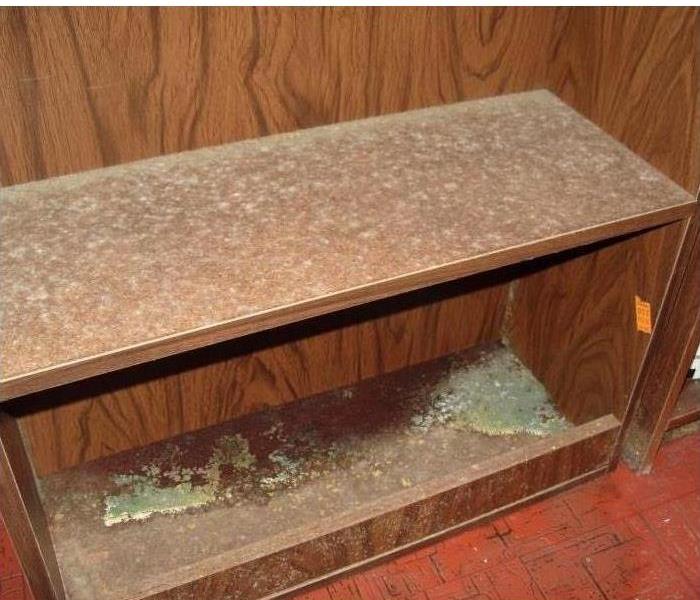 Wood book cases are porous so mold can get inside and spread quickly
Wood book cases are porous so mold can get inside and spread quickly
The fact is, mold is a part of the natural environment. Molds are a type of fungi that can be found almost anywhere, outside or inside, anytime of the year. Just in the United States alone, about 1,000 different species of mold can be found.
Outside, mold can play an important role in nature by breaking down living matter such as fallen trees, leaves that have fallen on the ground, and even dead animals. Medicines and some types of food would have never been developed without the presence of mold.
Indoor mold is a different story. This type of mold should try to be avoided. Problems may arise in a commercial building when mold starts eating away at certain materials. It can affect the way they look, the way they smell, and also the structural quality to buildings framed with wood.
Mold can grow on virtually any surface, as long as moisture, oxygen and an organic source is present in the area. The spores produced by these molds continuously float through the air outside and inside your building.
Excessive moisture in a building should be prevented since mold needs water to grow. Todays buildings are built to be tightly sealed with little ventilation, whereas, buildings built in the 1960's and 1970's were not usually as protected. Other moisture problems may also result from leaky roofs, gutters that allow water to go up under a building, and delaying maintenance issues that may contribute to the buildings moisture problems.
Our professionals at SERVPRO of Lenoir, Duplin & Jones Counties are trained to remediate mold issues in a timely manner should they arise in your commercial building or place of work.
Why Mold Should be Prevented in Commercial Buildings
2/9/2018 (Permalink)
 By preventing mold exposure in your workplace, hopefully you will have less worries of having to go to a Doctor.
By preventing mold exposure in your workplace, hopefully you will have less worries of having to go to a Doctor.
Coming into contact to indoor mold in a commercial building could possibly cause a variety of health problems. In some instances, the ones who could be affected the most by mold and mold spores are usually people who could already have weakened immune systems. People who are not as sensitive to mold related symptoms could also develop health issues due to mold exposure that they didn't even know existed in their building.
People who work or live in moldy conditions could possibly start out with only minor symptoms. If a person were to continue to be exposed mold or the exposure intensifies, their reactions could possibly worsen.
At SERVPRO of Lenoir, Duplin and Jones Counties, our trained technicians will do their best to eliminate any and all mold issues so you and your coworkers can get back to work without the worry of mold lurking.



 24/7 Emergency Service
24/7 Emergency Service
